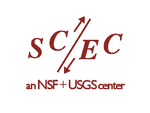Difference between revisions of "CTC Results"
| Line 3: | Line 3: | ||
[[CISN Testing Center]] evaluation results are presented as reference performance metrics. An important goal of a collaborative testing capabilities is the ability to compare equivalent results. | [[CISN Testing Center]] evaluation results are presented as reference performance metrics. An important goal of a collaborative testing capabilities is the ability to compare equivalent results. | ||
| − | == | + | == Testing Center Design Goals == |
| − | + | CTC is designed to meet scientific forecast testing goals described in Schorlemmer Gerstenberger (2005): | |
| − | + | # Transparency | |
| − | + | # Controlled Environment | |
| − | + | # Comparability | |
| − | + | # Reproducibility | |
For transparency, CTC evaluation summaries are identified with a CTC software version. When a CTC results is presented, all input data sets used in the calculation, all authorized data sets (observational data), and all source code is accessible to researchers. All calculations can be checked. | For transparency, CTC evaluation summaries are identified with a CTC software version. When a CTC results is presented, all input data sets used in the calculation, all authorized data sets (observational data), and all source code is accessible to researchers. All calculations can be checked. | ||
Revision as of 05:52, 20 June 2011
CISN Testing Center evaluation results are presented as reference performance metrics. An important goal of a collaborative testing capabilities is the ability to compare equivalent results.
Testing Center Design Goals
CTC is designed to meet scientific forecast testing goals described in Schorlemmer Gerstenberger (2005):
- Transparency
- Controlled Environment
- Comparability
- Reproducibility
For transparency, CTC evaluation summaries are identified with a CTC software version. When a CTC results is presented, all input data sets used in the calculation, all authorized data sets (observational data), and all source code is accessible to researchers. All calculations can be checked.
For controlled environment, CTC evaluation summaries are based on EEW forecasts created during earthquake processing and transmitted to the CTC testing center with no human intervention. Performance summaries are produced by CTC testing group, independent of algorithm developers. Observational data used is obtained from approved and authorized data sources (ANSS Catalog and ShakeMap).
For comparability, CTC evaluation summaries integrate information from multiple algorithms. CTC processing combines information from multiple algorithms producing comparable performance information for difference algorithms for same earthquakes.
For reproducibility, CTC results can be reproduced by retrieving the CTC software version used to produced the summaries. The CTC software can be run interactively, which enables any use to reproduce CTC results.


